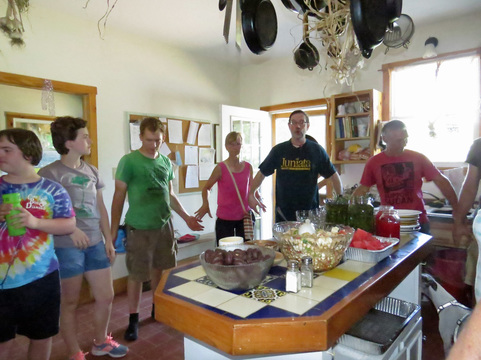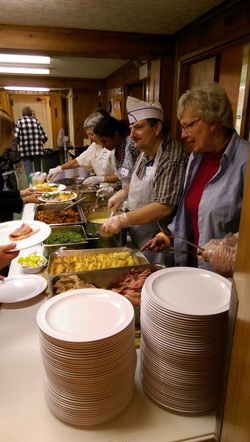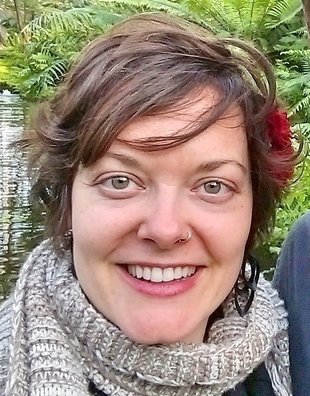 Matthew 5:1-12 "Blessed are the poor," we read in the Gospel of Luke's Beatitudes. "Blessed are the poor in spirit," we read in the Gospel of Matthew's Beatitudes. All the gospels demonstrate Jesus' care for the poor, and Luke's account of the good news is especially focused on Jesus' ministry to the economically poor. So when we read "Blessed are the poor" in Luke's account of the Beatitudes, it is reasonable to think of the economically poor. When we read "Blessed are the poor in spirit" in Matthew's account of the Beatitudes, we're probably not thinking of the economically poor at all. What does it mean to you to be poor in spirit? I think of people struggling with despair, with depression, with weariness, with wariness. Or people who don't have faith, people whose spirits are hollow or thin by lack of faith. The Greek phrase "blessed are the poor" is the same in Matthew and in Luke. Matthew simply has the extra "in spirit." Both gospel accounts use the same word for "poor" ptōchoi. Jesus didn't preach the Sermon on the Mount in Greek, he spoke in Aramaic, and the stories told about him were told to the writer of Matthew's acount of the good news in Aramaic, or in Hebrew. And we can look at Hebrew to find out more about this concept of "poor in spirit" because in the Old Testament, the word ‘a ni is used in the Psalms and Isaiah. [1] Sometimes the context is poverty, lacking property, for example. Other times the word is used to describe someone’s need for God. So if we stitch together ways that Hebrew has been translated into Greek, Greek into English, and Hebrew into English, we could read the Beatitudes in Matthew as Jesus saying “blessed are those who know their need for God.” Poor in spirit, as in, empty, ready, waiting to be filled up. Usually we think of emptiness as a negative thing, an empty stomach, an empty bank account, empty calories, empty promises. Yet emptiness can be a blessing. When our stomachs are empty, we are ready to be filled with a nourishing meal, and we can gather around a table with people we love and share our lives. When our Sunday afternoon schedules are empty we can celebrate the beauty of autumn leaves or catch up on sleep or read a book. Do you seek peace and calm in your life through emptiness or fullness? Do you sit in prayer or meditation, creating empty time, quiet, still, and renew your spirit in emptiness? Do you turn up your favorite music or go for a jog or cook a fabulous meal or build something – do you renew your spirit in fullness? When I play with our bell choir, or sing in our choir, my mind is so full of the music that I have no room left for worries or frets, I have to be completely present in this place, this moment, and my spirit is renewed in fullness. When I’m lying in shavasana at the end of yoga practice in total silence, total stillness, my spirit is renewed in emptiness. The Beatitudes flow between blessing emptiness and blessing fullness. Those who are full of mercy will be shown mercy. Those who are emptied out by their tears will be filled with laughter. Those who are full of peacemaking are God’s beloved. The poor in spirit will be filled by God. There’s a lot of stress in our lives these days, struggles in our families, jobs, health, finances…oh and there’s an election coming up! I pray that your faith and your spiritual practices are renewing your spirit, again and again. Matthew 11:28-30 Are you tired? Worn out? Burned out on religion? Come to me. Get away with me and you'll recover your life. I'll show you how to take a real rest. Walk with me and work with me — watch how I do it. Learn the unforced rhythms of grace. I won't lay anything heavy or ill-fitting on you. Keep company with me and you'll lean to live freely and lightly. (THE MESSAGE) Let us settle into our spirits, into peace, through poetry and music, through breath and silence. Our breathing is a constant reminder of the gifts of both emptiness and fullness. Feel free to close your eyes as I read and the orchestra plays, and enjoy how God has designed your body and breath to celebrate emptiness and fullness. In the Breath, Another Breathing Let it be that on this day we will expect no more of ourselves than to keep breathing with the bewildered cadence of lungs that will not give up the ghost. Let it be we will expect little but the beating of our heart, stubborn in its repeating rhythm that will not cease to sound. Let it be we will still ourselves enough to hear what may yet come to echo: as if in the breath, another breathing; as if in the heartbeat, another heart. Let it be we will not try to fathom what comes to meet us in the stillness but simply open to the approach of a mystery we hardly dared to dream. —Jan Richardson from Circle of Grace [1] http://christianity.stackexchange.com/questions/35754/what-does-it-mean-to-be-poor-in-spirit
1 Comment
 Jeremiah 29:1, 4-7 When I was seven years old I managed to save $8, to buy some special toy. It took me a long time to save $8; my weekly allowance was a quarter, and sometimes I could earn extra with extra chores. And whatever this toy was, $8 wasn’t enough, but I was getting close. Then our church announced a special offering for people in our town who might not be able to buy Christmas presents otherwise. The next Sunday I brought in all eight of those dollars and put it in the plate. I got a lot of praise for this act of generosity. I don’t remember what toy I wanted, but I remember the story because that attention felt so good! I’ve tried to live by the proverb, “live simply that others may simply live.” I don’t want to take more than my share of the world’s finite resources, because so many people don’t have enough. Understanding my life to be profoundly linked to other people’s lives around the world is meaningful and grounding to me. I'm learning that this way of thinking are whole story. These are scarcity concepts, that there are a limited amount of resources in the world, that by having extra, I’m denying someone else what they need. Now some things in this world are finite, like fossil fuels and trees and food. But even these resources can eventually replenish. Over generations we could turn all of Pennsylvania into forest if we committed to it. Millions of years from now this planet could have new stores of fossil fuels from the plants we tend today. Food is an interesting one – there is enough food produced on this planet to feed everyone alive on this planet. Our population grows faster than our food production does, but the main reason hungry people are hungry is that they don’t have access to food. So passing up dessert tonight won’t feed a hungry person in Somalia. Putting $8 in the offering plate probably did mean one gift to brighten someone’s Christmas morning. But even money isn’t truly finite, though like food, many people don’t have access to much, and can’t get the loans that make money virtually infinite. As stories were passed from generation to generation of the Hebrew people, and eventually recorded in what we now call the Old Testament, we watch these generations wrestle with whether God’s favor is finite or infinite. A scarcity mindset, understanding God’s favor to be finite, rises up and we read about the Israelites’ chosen people status, all those foreigners they believe they should kill to demonstrate their loyalty to God. And when an abundance mindset, seeing God’s favor as infinite, rises up, we read the prophets’ call to welcome the foreigner, care for the widow, tend to the orphan. We might expect a scarcity mindset from the Jews in exile in Babylon, we might expect them to call on God to punish their persecutors, to show favor only to their own tribe. Instead the prophet Jeremiah points the Jews toward an abundant God who calls people to seek the peace of the city in which they dwell, this home that is not their home, it is the home of their persecutors, is it a prison. Let’s check in on the history of this story – there are 12 tribes of Israel, after some challenging experiences with having kings rule over them the Israelites break into two groups, ten northern tribes of Israel, and two southern tribes of Judah. Various kings try to lead the tribes of Judah and also live with the Egyptians and Assyrians and Babylonians and all the other groups around them. The Babylonians conquer the tribes of Judah and take a group of them back to Babylon – these Jews are in exile, ripped away from their community, they’re reeling from failed kings, they still remember their meta-community, the 12 tribes, splitting apart, these are people of rupture and persecution and they are far from home with people who worship other gods, speak other languages, live by other rules, and these Jews didn’t ask to be here. This is not their home. And the prophet Jeremiah tells them that God calls them to seek the peace of this city in which they dwell, to build homes, to plant gardens, to harvest and eat, to grow families, to contribute to this place and this people that have forced them into exile. Because this is an abundant God with infinite favor to share. God rains water on the just, the unjust, and all of us who are both just and unjust in any given day. This city isn’t the home for these Jews in exile. But it is God’s home. And because the people remembered that all the land, all the rain, all the world, is God’s, and because they people remember that they are God’s, they are home in God’s home, wherever they may be. So rather than choose between helping themselves and helping someone else, rather than believing a scarcity mindset that either we can flourish or someone else can flourish, either someone else can have a toy at Christmas or I can buy myself a toy, the Jews remember that God’s home is everywhere, they are God’s, and they are at home wherever they go. When 16 of us went to New Community Project’s Sustainable Living Center in Harrisonburg we found people who realized that they could be at home together and by putting their time and sweat and love and wisdom toward making this home flourish they would all flourish. No choosing between doing for themselves and doing for someone else. No choosing between self-centeredness and charity for the needy. When we make a home with people who are in need, we make our homes flourish for all of our sake. Jesus says, “I came that you would live – and live abundantly!” We cannot live abundantly when we believe that either we can have, or someone else can have. When our sharing is always based on sacrifice. Remember that camp song, Love is like a magic penny? Hold it tight and you won’t have any Lend it, spend it and you’ll have so many, They’ll roll all over the floor! Well we might agree that love is an infinite resource, but it’s a struggle to see food, or time, or money, or electricity, or space, as infinite. And we can look at a map and see that land is finite. We can look at our calendars and see our time is finite. We probably can’t make much difference in home much food, time, money, electricity or land there is in this world. We can’t snap our fingers or develop an algorithm and make these resources astoundingly, abundantly, available. We can make these resources abundant when we join our lives with other people, when we live together, share a home, share a future, share needs and resources. |
Archives
January 2022
|

 RSS Feed
RSS Feed